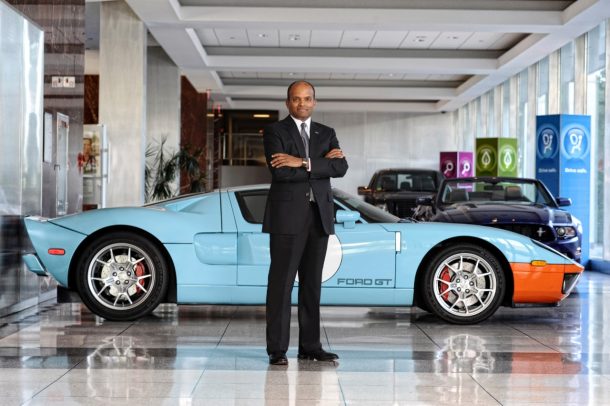Former Product Chief Nair to Head Ford North America; Armstrong Moves Up

After Monday’s corporate shakeup at Ford Motor Company, which saw former CEO Mark Fields replaced with Jim Hackett and the elevation of Joe Hinrichs and Jim Farley up company ranks, the automaker has announced more appointments.
To fill the job left by Hindrichs, who moved from president of Ford North America to head of global operations, Ford has named its product development boss and chief technical officer as a successor. Raj Nair, 52, will officially take on the role June 1st, reporting to Farley, Ford’s new head of global markets.
Below Nair, a slew of changes are afoot.
Ford of Europe’s current chief operating officer, Steven Armstrong, will gain a new title at the same time: head of Ford of Europe, Middle East & Africa. The executive, a former president of Ford South America, was COO of Volvo when Ford sold the Swedish brand to Geely Automotive Holdings Ltd.
The head of Ford’s Asia-Pacific division, Dave Schoch, will soon be going on longer vacations. The 40-year company veteran, who has held high-ranking positions in all of Ford’s regions, plans to retire at the age of 66. He’ll hand the reins over to current Asia sales director Peter Fleet on July 1st.
“Over the past five years, Dave has been a key architect of our tremendous growth in China, and overall success in Asia Pacific,” said CEO Jim Hackett in a company release.
Other changes among top brass include the naming of Mark Ovenden as vice president, Marketing, Sales and Service, Asia Pacific. Ovenden previously oversaw Ford’s Russian operations. To fill the new position of vice president of autonomous vehicles and electrification, Ford has appointed product development executive Sherif Marakby.
Hau Thai-Tang, a 25-year product development veteran who spearheaded engineering for former CEO Alan Mulally’s One Ford plan, has been named vice president, Product Development and Purchasing. From that post, he’ll oversee all of Ford’s global engineering, design and R&D efforts.
Other appointments include Neil Schloss’ elevation to vice president and chief financial officer of Ford’s mobility division, and Jeff Lemmer’s new role as vice president and chief operating officer of Information Technology. Both of these men will report to mobility head Marcy Klevorn. Ken Washington, current VP of research and advanced engineering, will take on the role of vice president for research and advanced engineering, as well as chief technology officer, on June 1st.
[Image: Ford Motor Company]

More by Steph Willems
Latest Car Reviews
Read moreLatest Product Reviews
Read moreRecent Comments
- 28-Cars-Later "elections"
- Tassos Good job, Senile, Corrupt Idiot-in-Chief.And when Inflation doubles again under your failed watch, LIE again that it was .. 9% when you took office, while THE REAL inflation then was less than 2%!Disgusting imbecile....
- Wjtinfwb Glad to see Toyota hanging in there with sedans. It's a bit clunky looking but no worse than a new BMW 7-series at 1/3 the price. More power would be nice but Toyota is married to the Hybrid/4-cylinder configuration. As this package gets refined I expect it will be come the norm.
- Wolfwagen The last couple of foreign vehicle manufacturers that tried breaking into the U.S. Mainstream Vehicle Market had a very hard time and 1. Couldn't get past the EPA regulation side (Mahindra) or 2. had a substandard product (Vinfast).
- Midori Mayari I live in a South American country where that is already the case; Chinese brands essentially own the EV market here, and other companies seem unable to crack it even when they offer deep enough discounts that their offerings become cheaper than the Chinese ones (as Renault found when it discounted its cheapest EV to be about 15% cheaper than the BYD Seagull/Dolphin Mini and it still sold almost nothing).What's more, the arrival of the Chinese EVs seem to have turbocharged the EV transition; we went from less than 1% monthly EV market share to about 5% in the span of a year, and it's still growing. And if — as predicted — Chinese EV makers lower their production costs to be lower than those of regular ICE cars in the next few years, they could undercut equivalent ICE car prices with EVs and take most of the car market by storm. After all, a pretty sizeable number of car owners here have a garage where they could charge, and with local fuel and electricity prices charging at home reduces fuel costs by over 80% compared with an ICE car.

































Comments
Join the conversation
What was Adam promoted too?
Nair and Farley know the business inside and out, these seem like smart moves, though I think Fields was a sacrificial lamb to appease the shareholders. None of these moves, btw, seem to show that FoMoco is abandoning Field's push into autonomy and mobility. Maybe it's because of Henry Ford's personal bigotries, but I couldn't help but notice Indian, Vietnamese, Arabic and Jewish surnames. If you choose talent, you'll almost necessarily end up with a diverse pool of workers.